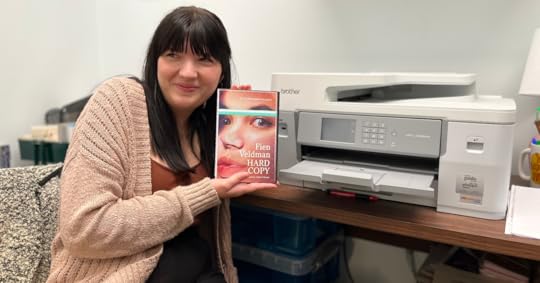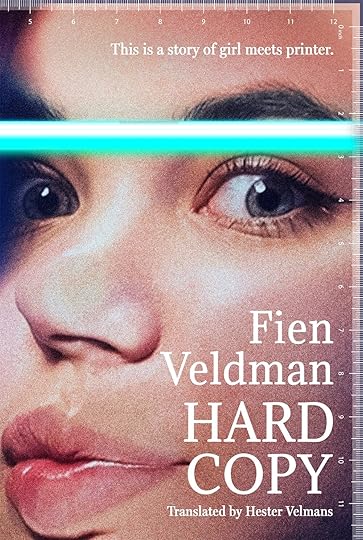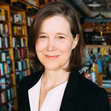The Art of Translation: An Interview with Hester Velmans

Hard Copy is one of those blink-and-you-might-miss-it kind of books (my favorite kind). Its premise is so deliciously weird and it story so plainly fun to read, you almost forget to notice how stuffed to the brim it is with pointed commentary. This book is not just an insight into how normalized it is for our workplaces to dehumanize us (although it is that), it is a look into questions of humanity — Who are we when we can no longer relate to the people around us? How much value can a person’s inner thought life have if it’s not being shared with anyone else? How can we define ourselves apart from our pasts? I feel like I found an absolute treasure in this book, and getting to chat with its translator, Hester Velmans, was the cherry on top.
— Maddie Grimes, Parnassus floor manager
 Hester Velmans
Hester VelmansMaddie Grimes: I am curious what your initial impressions were when you first read Fien Veldman’s Hard Copy? What was your experience as a reader, and what did you feel was the heart of this book that you knew you wanted to get across in the translation?
Hester Velmans: When I first picked up Hard Copy I was not sure what to expect. I thought it was going to be a comedy about navigating the pitfalls of the office universe. Although not lacking in humor (I found myself laughing out loud in some places), it’s actually a trenchant novel about inequality, exploitation and alienation. My challenge was to find a voice in English not only for the withdrawn, laconic young woman who is the main character, but also, later on in the story, for that of a machine — the inanimate object that is her closest companion.
MG: For anyone like me who is inexperienced in the art of translation, can you explain how you go about translating some of the non-literal lines or scenes in a book? For example, in Hard Copy, there is one scene where the main character is walking in slow motion through her city—moving so slowly that passersby think she is a statue or public art installation. As a reader of this scene, it was clear to me that the lines between metaphor and what was literally happening on the page were very blurry. Is it difficult to handle parts of the story like this?
HV: The aspect of translating I enjoy most is solving problems such as the one you describe — analyzing the author’s unique approach, and then, when I feel I have understood her intention, adapting it to another language without making it more puzzling or obscure than it is in the original. In this novel, for instance, there was a lot of switching between past and present tense, which is more common in Dutch than in English, so that I sometimes found myself adjusting the tense so that it wouldn’t sound jarring to the English ear — without losing the author’s intention.
MG: I would also love to know how much (if any) communication you had with Fien, the author, during your time working on this project? Do you ever consult the author for guidance, or is translating mostly an independent process?
HV: I’m lucky to have been able to communicate with every author I have translated (except one who wished to remain anonymous, but his publisher was helpful in transmitting my questions to him). I almost always work with the author closely, in person or remotely; in Fien’s case, we communicated by email in a three-way exchange with the English editor. This consultation usually happens once the translation is done, at the editing stage. That’s when the author can point out any misinterpretations on my part, or when I can explain why a certain passage can’t be translated word for word. There are many Dutch words that may sound virtually the same as in English, but contain subtle or not so subtle differences of meaning.
MG: Since you do translation work in not only Dutch, are there any differences you notice in your process when working with different languages? For this book, are there any peculiarities about English or Dutch that can make translation complicated?
HV: The only other language I translate is French, and I find French easier and faster to translate into English than Dutch. I think it may have something to do with the syntax: in English, the word order is usually a straightforward subject/verb/object, while in Dutch the sentence often ends with the verb, which means you have to shift the words around and try to not let it affect the meaning. There are lots of other differences, e.g. English likes to indicate continuity, the actual passage of time, while Dutch will use the straightforward present tense. So that if I translate a sentence literally, “I smoke a cigarette”, it will sound a bit blunt, like a stage direction; in English, “I am smoking a cigarette” sounds more normal. These linguistic quirks have to be handled carefully, otherwise the translation will sound awkward or unnatural.
MG: You are a writer as well as a translator. Do you feel that you get similar creative fulfillment out of both jobs? How is your process different between the two?
HV: That’s an interesting question. When working on my own material, I tend to let go of the reins, letting my imagination go, trying not to over-think it. When I translate, I’m turning every word and every phrase over in my mind, trying to work out what the author was thinking, and how to convey that in another language. It’s a much more deliberate process. That said, the creative fulfillment is the same — reading back what I’ve written, whether based on someone else’s ideas or my own, is always a thrill.
MG: Since we just celebrated Women in Translation Month in August, do you have any other translated fiction you love that you want to give a shout out to?
HV: The last translation I was enthusiastic about was My Heavenly Favorite by Lucas Rijneveld (translated by Michelle Hutchinson), a kind of Lolita set in a rural backwater, about an obsessed veterinarian pedophile and a motherless girl. It’s shocking, upsetting and gross, but also worth reading for the almost biblical gorgeousness of the language. Another Dutch book I’d recommend is Your Story, My Story by Connie Palmen, a brilliant retelling of the Ted Hughes-Sylvia Plath saga (translated by Eileen Stevens and Anna Asbury). And then of course there’s always Elena Ferrante…
MG: Thank you so much for answering these questions, Hester! To end, we always ask this final question: what is your favorite thing about independent bookstores?
HV: The best thing about independent bookstores is the people sitting behind the counter! The owner of my local bookstore is a dear friend, seems to know all his customers and always has an enthusiastic recommendation for what to read next. He was profiled in a documentary, Hello Bookstore.
Hard Copy is on our shelves now. Grab your copy today!
Ann Patchett's Blog
- Ann Patchett's profile
- 27414 followers




